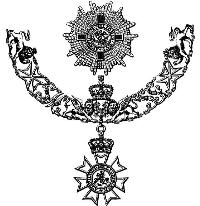
StMichaelandStGeorgeInsignia

29th Jan 1858 - 25th May 1925
Joined The Times
29th Jan 1858 |
Born in 15 Chesham St., Knightsbridge, Middlesex, London |
between 1871 and 1876 |
Educated Eton College, Eton, Buckinghamshire / Berkshire |
between 1876 and 1878 |
Military in Sandhurst Military College |
between 1878 and 1886 |
Military in Rifle Brigade in Afghanistan |
11th Feb 1882 |
Married Melloney Catherine SCOBELL in London, Middlesex England & Wales, FreeBMD Marriage Index: 1837-1915 |
between 1887 and 1889 |
Military in Camberley Staff College |
22nd Jan 1888 |
Birth of daughter Charles Edward Geoffrey À COURT REPINGTON |
8th Aug 1889 |
Death of daughter Charles Edward Geoffrey À COURT REPINGTON |
23rd Feb 1891 |
Birth of daughter Melloney Catherine Isobel À COURT REPINGTON |
1892 |
Birth of daughter Elizabeth Frances À COURT REPINGTON in St. George's, Hanover Square, Westminster, London |
1895 |
Birth of daughter Violet Emily À COURT REPINGTON |
1898 |
Death of daughter Violet Emily À COURT REPINGTON |
1899 |
Military in Boer War |
1899 |
Military in CMG |
1899 |
Military in Lieutenant-Colonel |
1900 |
Military in Posted to Egypt |
1902 |
Met |
between 1902 and 1904 |
Occupation Military correspondent of the Morning Post |
1904 |
Occupation Joined The Times |
1905 |
Military in Awarded the Légion d'honneur |
between 1910 and 1919 |
Resident in Maryon Hall, 19 Frognal Lane, Hampstead, London, Middlesex |
18th Jan 1911 |
Birth of daughter Lætitia Frances Mary À COURT REPINGTON in Hampstead, London, Middlesex |
Nov 1914 |
Occupation visited the Western Front during WWI |
1918 |
Occupation worked for the Daily Telegraph |
Jan 1918 |
Occupation resigned from The Times and joined the Morning Post |
1920 |
Misc in wrote 'The First World War' |
1920 |
Resident in 6 East Chapel St., Mayfair, Westminster, Middlesex, London |
1920 |
Resident in Lyford House, Dyke Road, Preston Village, Brighton, Sussex |
1922 |
Misc in wrote 'After the War' |
25th May 1925 |
Died in Pembroke Lodge, Hove, Sussex |
29th May 1925 |
Buried in St. Barnabas' Church, Hove, Sussex |
|
Married Mary Isabella NORTH |
Page created using GEDmill 1.11.0